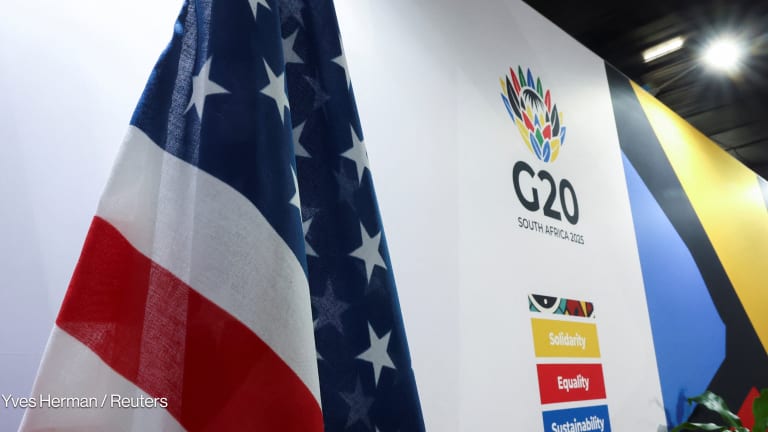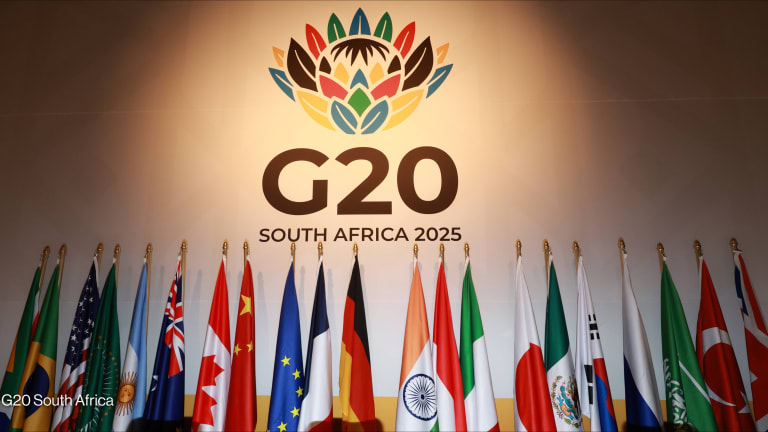
Global development is in “crisis,” World Bank President David Malpass said Monday, as the world tries to fend off multiple crises while still battling a two-and-a-half-year-old COVID-19 pandemic that continues to kill people and wreak havoc on the global economy.
Speaking at the Concordia Annual Summit during the the United Nations General Assembly annual gathering in New York City, Malpass explained that countries are now struggling to improve their people’s livelihoods.
“That’s hard to do,” he said. “Development, I think, is in crisis right now, without a direction of how to get that done for a lot of the countries.”
The existential threat of climate change combined with the war in Ukraine and soaring inflation have injected volatility and uncertainty into the global economy, a reality that may continue for a while.
“My additional worry is that it looks like this slowdown may persist,” Malpass said. “That's because there's not enough investment right now going on to really pull things forward and get productivity back up.”
Two years after the COVID-19-induced recession, the International Monetary Fund projected earlier this year that the global economy would grow by 3.2% this year and 2.9% in 2023, a significant dip from last year’s 6.1% expansion.
The current moment has seen “reversals in development” in areas such as education and childhood vaccinations, Malpass said. The World Bank and its U.N. collaborators at UNICEF and UNESCO are working to strengthen education after lockdowns forced countries to close down schools.
“That gives you the worry and the risk and the projection of a world recession.”
— David Malpass, president, World Bank“We are trying to build foundational school skills for children, and they've lost ground during COVID. So this is a big challenge to not only make up the lost ground and then actually move ahead,” he said.
The pandemic highlighted the problem of global inequality, he said, first in how vaccines were distributed, but now in other areas such as the food and energy crises, which have accentuated the discrepancies.
“These are big, staggering problems for the world to face,” he said.
One huge challenge that emerging countries especially are having to confront after the pandemic is the issue of debt.
“The debt burdens went up and right now there is no real process for the world to deal with, or to help countries that have unsustainable debt burdens,” Malpass said.
Where in the private sector companies have the option of declaring bankruptcies, there is little analogous process for nation-states grappling with high levels of debt.
“It’s very hard for countries, and the people of the countries, to have light at the end of the tunnel,” Malpass said.
Countries are asking themselves: “When will they be done paying this heavy debt burden and high interest rates that are going with it?” he asked.
The debt crisis has so unnerved officials at the World Bank and other policymakers that there are fears that multiple countries, especially emerging economies, could be hit by potential defaults, as Devex reported in August.
One such country that has failed to meet its obligations was Sri Lanka, which in May defaulted on its loans for the first time in its history. Economic woes in the Asian country sparked massive protests that forced the resignation of the country’s president in July.
But the global order has struggled to act and provide some relief for countries dealing with problems of debt, Malpass said, adding that the Group of 20 major economies' common framework for debt has stalled.
“We're trying to break it free with Zambia, so there is a chance of having a country actually achieve debt relief. It’s still a struggle,” he said. The southern African nation secured a bailout deal with the International Monetary Fund in September after it failed to pay its loan payments in 2020.
Last week, the Bank said that there was a narrow path to avoiding a recession but policymakers would need to get their decisions spot on and be lucky.
But with COVID-19 lockdowns in China, persistent high inflation in the United States and other economies, supply chains bottlenecks, and high energy prices, the global economy is seeing its sharpest downturn in years — and that trend is set to continue, Malpass said.
“That gives you the worry and the risk and the projection of a world recession,” he said.









